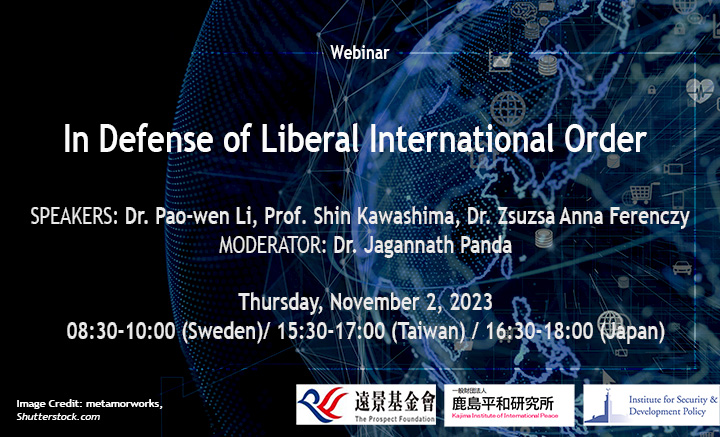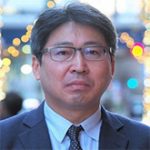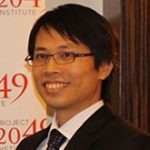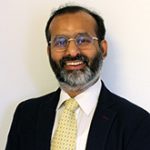In Defense of Liberal International Order

Thursday 2 November 2023 / 08:30 - 10:00 / Microsoft Teams
Webinar. Microsoft Teams, .
RSVP Register here
Did you miss this webinar? The full recording is available on ISDP’s YouTube channel.
The post-World War II liberal international order characterized by the US leadership, its alliances both in Europe and Asia, free trade, democratic partnerships, rule-making, and multilateral institution-building, among other features, is facing an intense crisis of governance and faith. In the last half-decade or so especially, the decline of the “American era”; the deterioration of democratic standards and rise of authoritarianism globally; Russia’s new aggression in its neighborhood; China’s unparalleled growth and rising military adventures in multiple regions across Asia (e.g., Taiwan Strait, Himalayan border, East and South China Seas); the Russia-China congruence; and the growing irrelevance of “old” multilateralism exemplified by the UN system including the Bretton Woods institutions have been not just unmaking the liberal world order but hastening its descent into a chaotic transition.
Global challenges such as the COVID-19 pandemic; North Korean nuclear resurgence; the military Junta’s continuing repression in Myanmar, Taliban’s rise; active armed conflicts in the Middle East; and the Ukraine war have re-emphasized that the global governance is not working effectively, if not entirely toothless. In the Indo-Pacific, where the effects of the changing global order are more than apparent, states are reorganizing and increasingly coalescing with like-minded partners via smaller, voluntary, non-binding minilateral forums to secure their interests and hedge against the geopolitical tensions marked by the US-China rivalry. The groupings range from the US-led Quadrilateral Security Dialogue (Quad) – a forum with a wide ambit from global health to maritime security – and AUKUS (Australia-UK-US) defense pact to the China-dominated Shanghai Cooperation Organization (SCO) and BRICS (Brazil-India-Russia-China-South Africa) – the latter are enjoying a newfound increase in popularity among the non-Western Global South states.
Of late, particularly from the perspective of the US and its allies and partners, including the European Union (EU), India, Japan, and South Korea, China has become the key disruptive player that is threatening the liberal order. China has amped up its economic, military, and technological advances with the intent to undermine the US-led existing order and to create a new China-led international order. For this purpose, it is looking to rebuild partnerships across the world, particularly in the so-called Global South – covering Latin America, West Asia, Africa, and Asia, among others in the developing and emerging world. While China’s influence has been on the rise among these states, its ties in Europe have been deteriorating primarily due to China’s coercive economic and diplomatic policies. In this context, the growth in transatlantic ties could be crucial to rebuilding an effective, representative liberal international order that is relevant in the new era.
This webinar aims to examine the extent of the decline of liberal internationalism in global governance, and whether it can resurge. It aims to address the following questions:
- Does the EU-US cooperation have particular importance in strengthening the liberal international order? In what ways? And what is the role of other democracies?
- What are the implications on the liberal order if the Indo-Pacific stability is seriously threatened/damaged, particularly if the China-Taiwan relations deteriorate further? Is maintaining the status quo the correct approach in view of China’s continuing excessive military aggression including recent exercises that likely simulated a Taiwan blockade?
- What is the significance of the Indo-Pacific region in reinvigorating the liberal international order?
- Will the rising minilateralism in the Indo-Pacific help upend the liberal order or boost its resurgence?
- How can the middle powers like India, Japan, and South Korea pave the way to strengthen the rule-based free, open, inclusive, and equitable order?
- Can the Global South play an important role in maintaining a Liberal International Order, despite its skepticism of the West rooted in colonial exploitation and post-war neglect?
Speakers:
 Dr. Shin Kawashima graduated from Tokyo University of Foreign Studies in 1992 and obtained a PhD at the University of Tokyo in 2000. He has been serving as a Professor of the Graduate School of the University of Tokyo since 2015 and also as Executive Director of Research, at Nakasone Peace Institute since 2022.
Dr. Shin Kawashima graduated from Tokyo University of Foreign Studies in 1992 and obtained a PhD at the University of Tokyo in 2000. He has been serving as a Professor of the Graduate School of the University of Tokyo since 2015 and also as Executive Director of Research, at Nakasone Peace Institute since 2022.
 Dr. Pao-wen Li is an assistant professor at the Institute of China and Asia-Pacific Studies, National Sun Yat-sen University, Taiwan. His research focuses on international relations, cross-strait relations, and the dynamics of US-China relations. Dr. Li served as a Deputy Research Fellow in the headquarters of the Democratic Progressive Party from 2004 to 2009 and as a Research Fellow in the R.O.C. National Security Council from 2016 to 2019.
Dr. Pao-wen Li is an assistant professor at the Institute of China and Asia-Pacific Studies, National Sun Yat-sen University, Taiwan. His research focuses on international relations, cross-strait relations, and the dynamics of US-China relations. Dr. Li served as a Deputy Research Fellow in the headquarters of the Democratic Progressive Party from 2004 to 2009 and as a Research Fellow in the R.O.C. National Security Council from 2016 to 2019.
 Dr. Zsuzsa Anna Ferenczy is an Affiliated Scholar at the Department of Political Science of the Vrije Universiteit Brussel (Free University of Brussels), Associated Research Fellow at ISDP, Head of the Associate Network at 9DASHLINE, Research Fellow at Taiwan NextGen Foundation, Consultant on China, Taiwan and the Korean Peninsula of Human Rights Without Frontiers. Currently, Zsuzsa is an Adjunct Assistant Professor at the National Dong Hwa University in Hualien, Taiwan. Zsuzsa’s fields of expertise are EU foreign and security policy, European normative power and human rights, EU relations with China and Taiwan in the Indo-Pacific.
Dr. Zsuzsa Anna Ferenczy is an Affiliated Scholar at the Department of Political Science of the Vrije Universiteit Brussel (Free University of Brussels), Associated Research Fellow at ISDP, Head of the Associate Network at 9DASHLINE, Research Fellow at Taiwan NextGen Foundation, Consultant on China, Taiwan and the Korean Peninsula of Human Rights Without Frontiers. Currently, Zsuzsa is an Adjunct Assistant Professor at the National Dong Hwa University in Hualien, Taiwan. Zsuzsa’s fields of expertise are EU foreign and security policy, European normative power and human rights, EU relations with China and Taiwan in the Indo-Pacific.
Moderated by:
 Dr. Jagannath Panda is the Head of the Stockholm Center for South Asian and Indo-Pacific Affairs at the Institute for Security and Development Policy, Sweden. He is also a Senior Fellow at The Hague Center for Strategic Studies in the Netherlands, and an International Research Fellow at the Canon Institute for Global Studies in Japan. Dr. Panda has testified to the US-China Economic and Security Review Commission at the US Congress. He is the Series Editor for Routledge Studies on Think Asia.
Dr. Jagannath Panda is the Head of the Stockholm Center for South Asian and Indo-Pacific Affairs at the Institute for Security and Development Policy, Sweden. He is also a Senior Fellow at The Hague Center for Strategic Studies in the Netherlands, and an International Research Fellow at the Canon Institute for Global Studies in Japan. Dr. Panda has testified to the US-China Economic and Security Review Commission at the US Congress. He is the Series Editor for Routledge Studies on Think Asia.
This event is held in cooperation with the Prospect Foundation (PF) in Taiwan and the Kajima Institute for International Peace (KIIP) in Japan